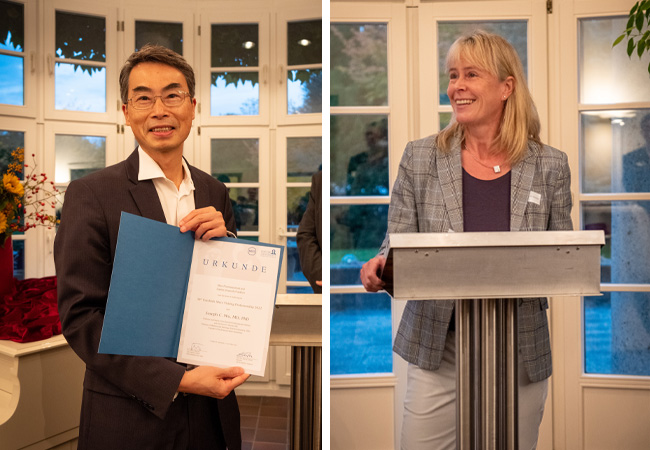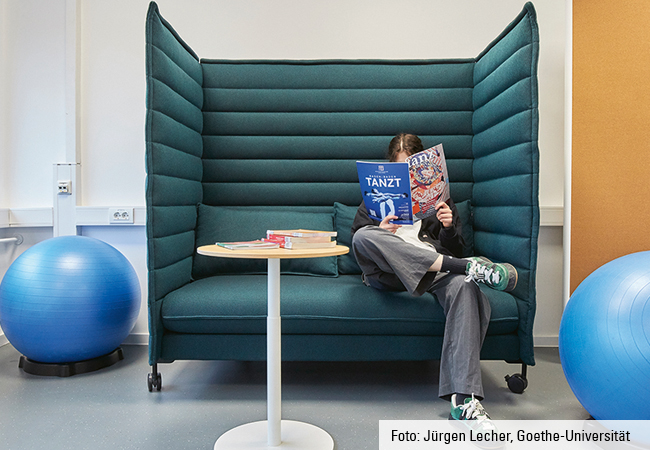French sociologist Bénédicte Zimmermann is the “Alfred Grosser Visiting Professor for Civil Society Research” at Goethe University this winter semester.
UniReport: Prof. Zimmermann, as a French sociologist in Germany, you’ve been studying the changes in the sphere of work for a long time. What are the differences between the French and German concepts of “work” – are there specific national features, even in these times when work is increasingly globalized?
Bénédicte Zimmermann: Even though the national aspects of the concept of work have been effaced to a certain extent by globalization in business, for example by common trends towards flexibilization and raising productivity and profits, but also through measures to modernize the social welfare state (such as the “Hartz 4” legislation in Germany), they have certainly not been eradicated. The concept of Good Work provides a good example of this because, originally, at the beginning of the 2000s, it was driven forward by the European Commission under the motto “Quality of work”. The aim – apart from the classical criteria for working conditions such as pay, working hours, accident protection and physical strain – was also to highlight the psychological consequences of work, such as stress and burnout. However, the semantic field that developed in the EU’s publications now includes German and French translations that are at variance.
How would you characterize these differences in the French and German translations?
In France, the focus has been on “psychological burdens at the workplace” and understood as a matter for public and occupational health policy under the motto “qualité de vie au travail”. In Germany, by contrast, the topic of “quality of work” has been rolled out by a trade union campaign under the motto “decent work” in a context of increasing precariousness in the wake of the Hartz reforms. While the French discourse reflected on the subjective aspect of the quality of work in the sense of tolerable work, the Germans concentrated more on the question of desirable work. Here the discussions addressed the gap between actual working conditions and what the workforce wants, as a problem for society. The assumed expectations of employees, as communicated by the trade union representatives, form the starting point for the definition. But in France, the health of the workforce provides the foundation for defining “quality of life at the workplace”. So, where Germans speak of a social and societal problem, the French speak more of a problem in public health.
How did these differences come about?
One major factor definitely lies in the differing ways that work is regulated in the two countries. In Germany, work is regulated in a decentralized and participatory manner through codetermination, and therefore work-related expertise tends to be mobilized within employers’ and employees’ organizations. On the other hand, the centralized, adversarial French system leads to greater external mobilization of expertise that comes to the fore in national, public debates. These observations are echoed in the thesis of the “effet societal”, which Marc Maurice, François Sellier and Jean-Jacques Silvestre developed in a Franco-German comparison back in the 1980s. Their thesis states that the employment relationships in France and Germany – and work generally – are rooted in societal configurations that unfold at the point where three types of relations meet: the “training relations” (the initial and further vocational training system), the “industrial relations” (labor relations), and the “organizational relations” (workplace structure, hierarchy of players in the company, modes of management and cooperation). This thesis turns out to remain largely relevant even today, with an increasing “hydrogenation” of the two configurations becoming apparent.
The concept of work (in German use primarily the concept of one’s occupation) is frequently associated with the meaning of (individual) life, and of self-realization. But today we also talk about the younger generation in particular wishing to mitigate the risk of overwork and striving for a reasonable work-life balance. Do you also observe this tendency?
This emphasis on the individual dimension of work reflects the differences I just mentioned. In Germany it is not only the upcoming generation that is paying attention to their work-life balance; this is also a key aspect in the trade unions’ debates on Decent Work, although we do observe a growing demand in this respect among the younger generation. This demand is now more frequently accompanied by another, equally important issue, namely the ecological sustainability of work. And in fact in France we see the same trend towards a better work-life balance and towards work that respects the Earth and other living beings. Some graduates from universities such as the AgroParisTech and HEC, which educate the future top managers in French companies, hit the headlines this year when, at their graduation ceremony, they called the jobs for which they had been trained “destructive” and appealed for changes to the corporate rules of play. So, even if only a small number of graduates are as active as this, something is shifting.
Not least, digitization is also permanently changing work and working relations. What will happen if academic occupations are replaced by Artificial Intelligence? Or is that not very likely?
The impacts of digitization are ambivalent. Firstly, the possibility of working from home opened up by digitization can improve the work-life balance, and secondly, digitization also brings with it what Mary L. Gray and Siddharth Suri have termed “ghost work”, i.e. work that is essential for Artificial Intelligence to function smoothly but which cannot be performed by the machines, even though it is usually either unskilled or only semi-skilled. This work is outsourced to freelancers on piecework who have no protection under labor law, which fosters the emergence of a new worldwide underclass. If we look at digitization from an ecological perspective, it appears to be just as ambivalent. Digitization enables working from home, which can make work more ecologically sustainable by helping to shorten travelling time and reducing the areas covered by companies, especially in the service sector. But digital technologies simultaneously encourage non-sustainable work because of the quantity of energy they need. And this begins with the energy-hungry infrastructures required for sending emails or surfing the internet.
Over the last two years, the topic of working from home was suddenly at the front of our minds due to the corona pandemic. How do you think this will develop?
It’s hard to say how it will go. Working from home will remain popular, that much is certain. At the same time, however, some employees and companies are becoming less enthusiastic. It is true that working from home can also lead to isolation and anomy among the workers, and for the companies to a diminished collective cooperation dynamic.
Your public lecture is entitled “Lifelong training: societal, corporate or individual responsibility? A Franco-German comparison”. Could you tell us more about that?
There are several different objectives served by lifelong training (e.g. corporate competitiveness, combating unemployment, training for a different job and personal development), and it’s not easy to integrate them. Training for the purpose of adapting to the firm’s needs or a rapid return to the labor market cannot necessarily be combined with what the persons concerned wish to achieve through their training programs. This throws up questions – about the individual’s scope for flexibility and taking action in relation to training, and also about how the responsibility for promoting this ability to act is distributed between public institutions, companies, social partners and individuals. An empirical survey of social advancement training at a multinational aviation company and two of its production sites shows that in Germany the individual workers have more responsibility for advancement training than they do in France. The lecture aims to solve the puzzle of why this is so despite the codetermination institutions giving the German workers a certain power that simply does not exist in France.
Questions: Dirk Frank
Bénédicte Zimmermann is Professor of Sociology at the École des hautes études en Sciences Sociales in Paris, and a Permanent Fellow at the Wissenschaftskolleg in Berlin. She will deliver the public lecture on “Lifelong training: societal, corporate or individual responsibility? A Franco-German comparison” in the Casino Building, 1.801 Renate von Metzler Room on Monday, 30 January 2023, starting at 7.00 p.m.
The Alfred Grosser Chair for Civil Society Research was established in 2009 by the Polytechnic Foundation of Frankfurt am Main, on the initiative of the Franco-German Society. The project is intended to drive forward research and public discourse on civil society in Frankfurt, and to make them more visible internationally.
Photo: Emmanuel Quetin














